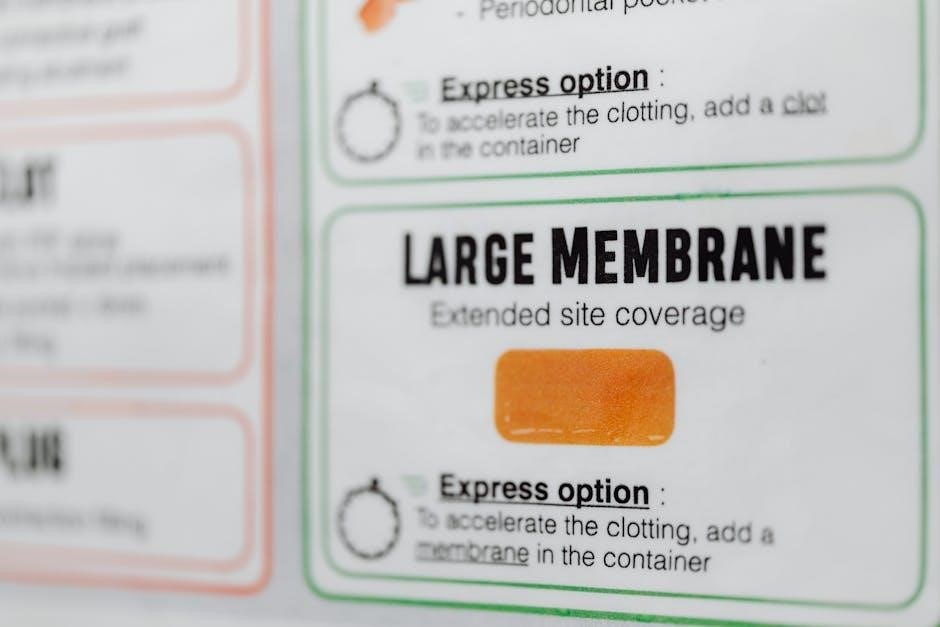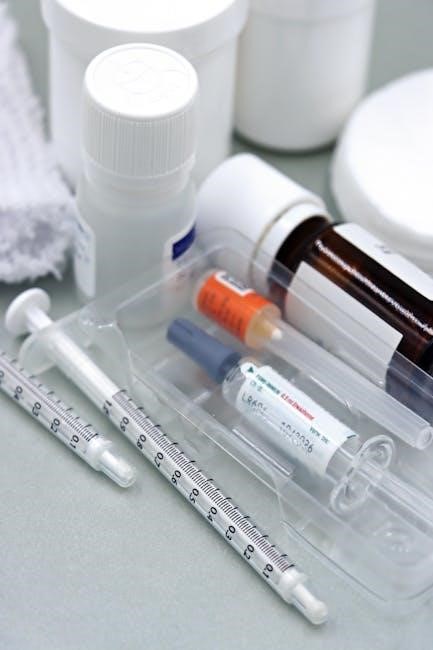
Understanding the Importance of Medical Terminology Worksheets
Medical terminology worksheets are essential tools for mastering complex healthcare terms, offering structured practice and reinforcement. They break down terms into prefixes, roots, and suffixes, aiding comprehension. Worksheets enhance retention through interactive exercises like matching and fill-in-the-blank activities, making learning engaging and effective for students and professionals alike. Regular practice with these resources ensures proficiency in medical communication, a critical skill in healthcare settings. Consistent use of worksheets helps build a strong foundation, enabling accurate documentation and clear communication in patient care. These resources are versatile, catering to both beginners and advanced learners, and are often supplemented with diagrams and flashcards for comprehensive understanding. By focusing on real-world applications, worksheets bridge theory and practice, ensuring practical proficiency in medical terminology. Overall, they are indispensable for anyone aiming to master medical language efficiently.

Why Medical Terminology is Essential for Healthcare Professionals
Medical terminology is the foundation of effective communication in healthcare, enabling professionals to accurately document, interpret, and share patient information. Understanding medical terms ensures precise diagnosis, treatment, and care coordination. It facilitates clear communication among healthcare teams, reducing errors and improving patient outcomes. Proficiency in medical terminology is critical for interpreting lab results, medications, and procedures. It also aids in understanding anatomical structures and physiological processes, essential for clinical decision-making. Without a strong grasp of medical terminology, healthcare professionals may misinterpret critical information, leading to potential harm. Thus, mastering medical terminology is vital for providing safe, efficient, and high-quality patient care in any healthcare setting.
How Worksheets Enhance Learning and Retention
Medical terminology worksheets are highly effective for enhancing learning and retention. They provide structured, hands-on practice that engages learners actively, making complex terms easier to understand and remember. By breaking down terms into prefixes, roots, and suffixes, worksheets help learners decode meanings, fostering deeper comprehension. Interactive exercises, such as matching and fill-in-the-blank activities, promote repetition and reinforcement, key to long-term retention. Worksheets also allow for self-assessment, enabling learners to identify gaps in knowledge and focus on areas needing improvement. Regular practice with worksheets builds confidence and proficiency, ensuring healthcare professionals can communicate accurately and effectively in clinical settings. This structured approach makes learning efficient and enjoyable, leading to better mastery of medical terminology.

Key Components of a Medical Terminology Worksheet
Medical terminology worksheets typically include prefixes, suffixes, roots, and anatomical terms. They often feature matching exercises, fill-in-the-blanks, and diagrams to aid in understanding complex terms effectively.
Common Word Parts: Prefixes, Suffixes, and Roots
Mastering prefixes, suffixes, and roots is fundamental to understanding medical terminology. Prefixes indicate location, number, or direction (e.g., hyper- meaning “above”). Suffixes denote procedures, conditions, or diseases (e.g., -itis for inflammation). Roots provide the core meaning, often relating to body parts or functions (e.g., cardi- for heart). Worksheets often include exercises that break down terms into these components, enhancing comprehension. For example, hypertension combines hyper- (above) and tens- (tension), meaning high blood pressure. Practicing with these word parts improves the ability to decode and construct medical terms accurately, a vital skill for healthcare professionals and students alike.
Anatomical Terms and Body Systems
Understanding anatomical terms and body systems is crucial for mastering medical terminology. Worksheets often include exercises that focus on terms related to body structures and systems, such as the skeletal, muscular, and respiratory systems. For example, terms like cardio- (heart) or pulmon- (lungs) are commonly used. These exercises help learners associate prefixes, suffixes, and roots with specific anatomical regions. By practicing terms like endocarditis (inflammation of the heart’s inner lining) or pneumonia (lung infection), users gain clarity on how terms describe conditions and procedures. This structured approach ensures accurate communication in healthcare settings, making anatomical terminology a cornerstone of medical education.

Popular Types of Medical Terminology Worksheets
Common types include matching exercises and fill-in-the-blank activities, designed to enhance term recognition and application. These worksheets are widely used for structured, engaging learning experiences in medical education.

Matching Exercises for Term Recognition

Matching exercises are a popular method for recognizing and memorizing medical terms. These worksheets typically present terms in one column and their definitions or related concepts in another, requiring learners to draw connections. By linking terms to their meanings, students improve retention and understanding. Interactive PDF versions allow users to type or click-and-drag answers, enhancing engagement. Visual association between terms and definitions strengthens memory. These exercises reduce ambiguity, ensuring learners grasp precise meanings. They are particularly effective for beginners, as they simplify complex terminology. Matching exercises are also versatile, catering to different learning styles and preferences, making them a valuable tool for mastering medical terminology efficiently and effectively.
Fill-in-the-Blank Activities for Active Learning
Fill-in-the-blank exercises are dynamic tools that promote active learning and critical thinking in mastering medical terminology. These activities require learners to complete sentences or definitions by inserting the correct terms, fostering a deeper engagement with the material. By actively recalling and applying knowledge, students reinforce memory and improve comprehension. Many PDF worksheets offer fill-in-the-blank exercises that cater to various skill levels, ensuring relevance for both beginners and advanced learners. Immediate feedback is often provided, enabling learners to identify and correct mistakes. This interactive approach enhances problem-solving skills and builds confidence in using medical terms accurately. Regular practice with these exercises accelerates mastery of complex terminology, making them indispensable for healthcare education and professional development.

Interactive and Engaging Worksheet Formats
Interactive worksheets incorporate multiple-choice questions, case studies, and real-world scenarios, enhancing learning through practical application. These formats encourage active participation and self-assessment, making terminology mastery both effective and engaging.
Multiple-Choice Questions for Self-Assessment

Multiple-choice questions in medical terminology worksheets are a powerful tool for self-assessment, allowing learners to test their knowledge and identify gaps. These questions often focus on defining terms, matching prefixes/suffixes to meanings, or selecting the correct abbreviation. Interactive and engaging, they cater to different learning styles, reinforcing understanding through repetition and immediate feedback. Many worksheets include answer keys, enabling learners to track progress and review mistakes. This format is particularly effective for complex terms, as it encourages critical thinking and application of knowledge. Regular use of multiple-choice exercises builds confidence and ensures long-term retention of medical terminology, making it a valuable study resource.
Case Studies and Real-World Applications
Case studies and real-world applications in medical terminology worksheets provide learners with practical insights into how terms are used in actual patient care scenarios. These exercises simulate real medical situations, enabling students to apply their knowledge of prefixes, suffixes, and roots to diagnose and treat virtual patients. By analyzing case studies, learners develop critical thinking skills and understand the context in which medical terms are used. Worksheets often include scenarios involving common medical conditions, requiring learners to identify and define relevant terminology. This approach enhances problem-solving abilities and prepares healthcare professionals for real-life challenges, making learning both engaging and impactful. Such exercises are widely available in downloadable PDF formats, offering convenient access to practical learning tools.

Resources for Downloading Medical Terminology Worksheets
Free PDF worksheets and advanced workbooks are widely available online, offering comprehensive exercises for mastering medical terminology. These resources cater to both beginners and professionals, ensuring accessible learning tools.
Free PDF Worksheets for Beginners
Free PDF worksheets are ideal for newcomers to medical terminology, offering a foundational understanding of prefixes, roots, and suffixes. These resources provide clear, structured exercises to practice term recognition and definition matching. Many worksheets include basic word parts and their meanings, helping learners build a strong vocabulary. They are easily downloadable and printable, making them accessible for self-study. Websites like MedicsCenter and other educational platforms offer these PDF files, ensuring beginners can start their journey without cost. The exercises are designed to be simple yet effective, focusing on common medical terms and abbreviations. This makes them perfect for students or professionals looking to grasp the basics of medical terminology efficiently;
Advanced Workbooks for Professional Development
Advanced workbooks are designed for healthcare professionals seeking to deepen their knowledge of medical terminology. These resources often include complex exercises, such as case studies and multiple-choice questions, to challenge learners. They focus on specialized terms and real-world applications, ensuring professionals stay updated with industry standards. Many workbooks are tailored for specific medical fields, offering targeted practice for expertise. Advanced exercises emphasize critical thinking and practical application, making them ideal for continuing education. These workbooks are frequently used alongside textbooks or as standalone tools for professional development. They provide a comprehensive approach to mastering intricate terminology, ensuring proficiency in high-level medical communication and documentation.

Best Practices for Using Worksheets Effectively
Consistent study strategies, such as daily practice and review, enhance mastery of medical terminology. Using flashcards and diagrams alongside worksheets provides a comprehensive learning experience, ensuring long-term retention and practical application in healthcare settings.
Study Strategies for Mastering Complex Terms
Effective study strategies for mastering complex medical terms involve consistent practice and active engagement. Breaking down terms into prefixes, roots, and suffixes simplifies learning. Using flashcards and diagrams helps visualize connections, while regular reviews reinforce memory. Organizing study sessions with focused time blocks enhances productivity. Engaging in interactive exercises, like matching games and fill-in-the-blank activities, promotes retention. Additionally, associating terms with real-world scenarios or case studies deepens understanding. Utilizing workbooks and online resources, such as PDF worksheets, provides structured practice. Creating personalized notes and summaries can also aid in retaining complex terminology. Combining these methods ensures a comprehensive grasp of medical language, essential for healthcare professionals.
Using Flashcards and Diagrams as Supplements
Flashcards and diagrams are powerful tools that complement medical terminology worksheets. Flashcards provide quick, portable reviews, ideal for memorizing term definitions and word parts. They allow learners to test their knowledge and identify gaps. Diagrams, such as anatomical illustrations, help visualize term origins and relationships, making complex concepts more tangible. Combining both resources enhances retention and understanding. For instance, flashcards can reinforce terms from worksheets, while diagrams offer contextual learning. This multimodal approach ensures a deeper grasp of medical terminology, making it easier to apply in real-world scenarios. Together, these supplements create a comprehensive study system that supports both visual and kinesthetic learners.